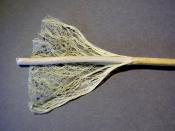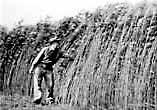Despite hemp's hidden involvement in American history, it was banned in 1961 due to America's war on drugs. So it is often over looked as a sustainable resource. Hemp has the potential to change every industry for the better. Jack Herer, hemp activist and the author of "The Emperor Wears No Clothes," explains in his book, "almost any product that can be made from wood, cotton, or petroleum (including plastics) can be made from hemp. There are more than 25,000 known uses for hemp." He goes on to say that it is also the fastest growing sustainable resource in the plant world. What Americans are overlooking can solve many important problems in America.
George Washington once said "Make the most you can of the Indian hemp seed and sow it everywhere." Hemp farming has its roots deep in American history. According to the North American industrial hemp council (NAIHC) "Because of its importance for sails (the word "canvass" is rooted in "cannabis") and rope for ships, hemp was a required crop in the American colonies.
NAIHC later explains that George Washington and Thomas Jefferson both grew hemp. In fact, Thomas Jefferson wrote both drafts of The Declaration of Independence on hemp paper. The hemp museum curator, Richard M Davis, says in the mid 1600's to the 1800's Connecticut and Massachusetts citizens could pay their taxes with hemp. Davis also says that the first American flag was made from the strongest material they could find, hemp. The founding fathers obviously felt that hemp is a valuable resource 200 years ago, but hemp has more recent history in America as well. Henry Ford built entire car bodies and interiors out of hemp and started experimenting with hemp seed oil to fuel and grease engines, the diesel engine was...


